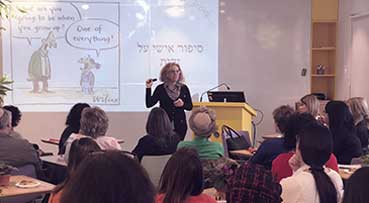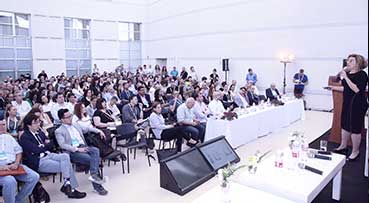Changes in the world of work compel us to reconsider how we perceive jobs and the terms we use, like “knowledge workers” or “unskilled workers.” As people blend work with other activities in new ways, these definitions often fail to capture the evolving labor market’s complexity, preventing us from recognizing opportunities for both employees and employers. Today, more “knowledge workers” may choose entry-level jobs for various personal and professional reasons.
At first glance, this seems like an anomaly. In a competitive job market that constantly seeks skilled workers, where employees understand the need for continuous development, we would expect everyone to chase skill enhancement. Surprisingly, however, the relentless pace of technological advancement that renders experience and skills obsolete, along with shifts in personal priorities, leads to the opposite phenomenon—people taking jobs below their skill level, becoming overqualified.
This is another stage in the gig economy’s development. During the pandemic, when many were confined to their homes and unable to seek “regular” employment, 23 million people discovered this form of work, using it to navigate challenging job market periods. Between the extremes—skilled freelancers on one side and unskilled workers doing simple jobs on the other—a growing space of people intentionally choosing jobs where their skills exceed the requirements is emerging.
Economic Safety Nets for Career Transitions
Take, for example, a forty-something web designer whose business is declining due to new tools that allow clients to design their own websites. Until he adjusts to the changing environment, he may take delivery shifts to supplement his reduced income. And he’s not alone.
In today’s fast-paced world, career cycles are shortening, and multiple career transitions are becoming the norm. More people find they need to make a change that includes investment in training, often without prior preparation. Paradoxically, the need to constantly learn and develop to keep up with rapidly outdated knowledge may lead people to seek jobs below their skill level in the short term. Such jobs do not demand much from them, leaving them with time, energy, and focus to invest in development. Skilled individuals discover that working “between jobs” in entry-level positions is a flexible and convenient solution, bypassing organizational gatekeepers thanks to platforms in the gig economy. Thus, they create an economic safety net while acquiring tools and exploring options to make informed career decisions rather than decisions driven by immediate pressure or distress.
Sometimes, the very act of working is part of exploring options. People may take jobs below their skill level as strategic entry points into an organization, industry, or occupation they are interested in. This allows them to learn the language, build a network, and gain experience. This presents a tremendous opportunity for organizations willing to rethink “overqualification” and turn it from a disadvantage into an advantage. This concept is not new to companies that hire students for summer projects or part-time work during their studies. Organizations understand that students bring value despite being temporary and leaving after graduation. Students understand they are in roles that do not always allow them to fulfill their full potential, but they enjoy flexibility, pay, and often relevant experience for the future. Now, this also applies to later career stages, allowing organizations to hire people with previous experience and skills for different roles and industries.
Work that Matters
Beyond economic necessity, many people seek roles that align with their personal values and fulfill their need for purpose and meaning. Many dedicate time and energy to their community or volunteer for causes that matter to them, often in roles unrelated to their skills and professional experience. You might find a CEO repairing furniture in a nonprofit that helps displaced families or an accountant serving food at a local shelter. In many conversations with such volunteers, it became clear they gained value not only from the impact of their work but also from the break from their regular job and its dynamics. As one CEO put it, the ability “to take a break” for a few hours a week was invaluable.
On the surface, this is not paid “work,” but the depth of the processes people undergo during these times can lead to significant career changes, as happened during the pandemic. The Great Resignation that followed caused many older individuals to leave established careers and pursue their dreams, turning side activities, hobbies, and volunteer work into new careers.
Working to Fund Something Else
The changing social contract between work and life reflects a shift in definitions of success and a desire for something greater than the traditional career ladder climb. In the gig economy, people choose jobs below their skill level to free up time and energy for other important aspects of life. Sentiments of “who needs the pressure” expressed in hashtags like Lying Flat and Lazy Girl Jobs from Asia or headlines like Hustle Culture is Dead from the West reject the social pressure for hard work and competitiveness. This reflects a discourse around questions like how much is “enough” and a reevaluation of flexibility and personal time over traditional career advancement.
The same technology that replaces parts of work and increases productivity might now be a solution if some of the freed-up time is returned to employees. But until the job market changes its face and adopts a culture of “less work,” those who want to reduce working hours, pressure, and responsibility to increase personal time turn to the gig economy as an alternative. Although the average pay in such jobs is lower than in salaried positions, the flexibility and ability to work remotely often allow people to adjust their location and lifestyle, prioritizing quality of life over prestige and salary. Organizations that understand this need can benefit from skilled and experienced individuals who want part-time, project-based, flexible work even for lower pay.
The changing needs and preferences of people during this period are creating a more diverse and dynamic world of work. As employees, we no longer need to limit ourselves to traditional paths or definitions, nor depend on gatekeepers to determine how we work. The evolving world of work gives us the tools to create combinations that fit our changing needs. Organizations that understand this will gain access to talent they may not currently see. By accepting jobs that enable them to focus on their passions, achieve work-life balance, avoid burnout, or match their lifestyle preferences, individuals are redefining the relationship between work and life. This new social contract emphasizes personal growth, well-being, and fulfillment.
As we move forward, it is essential to rethink how we categorize and value work. By recognizing and addressing the diverse motivations and needs of today’s workforce, we can create a more inclusive and dynamic employment landscape. The future of work isn’t about fitting individuals into predefined categories but about creating opportunities that allow everyone to thrive. Embracing this new approach will enable both individuals and organizations to adapt and succeed in an ever-evolving world.

![large-AX1A2125-2[1]](https://niritcohen.com/wp-content/uploads/elementor/thumbs/large-AX1A2125-21-pnzedcs72atx5aeurqytqdiihxixlq02re9mlz805s.jpg)






